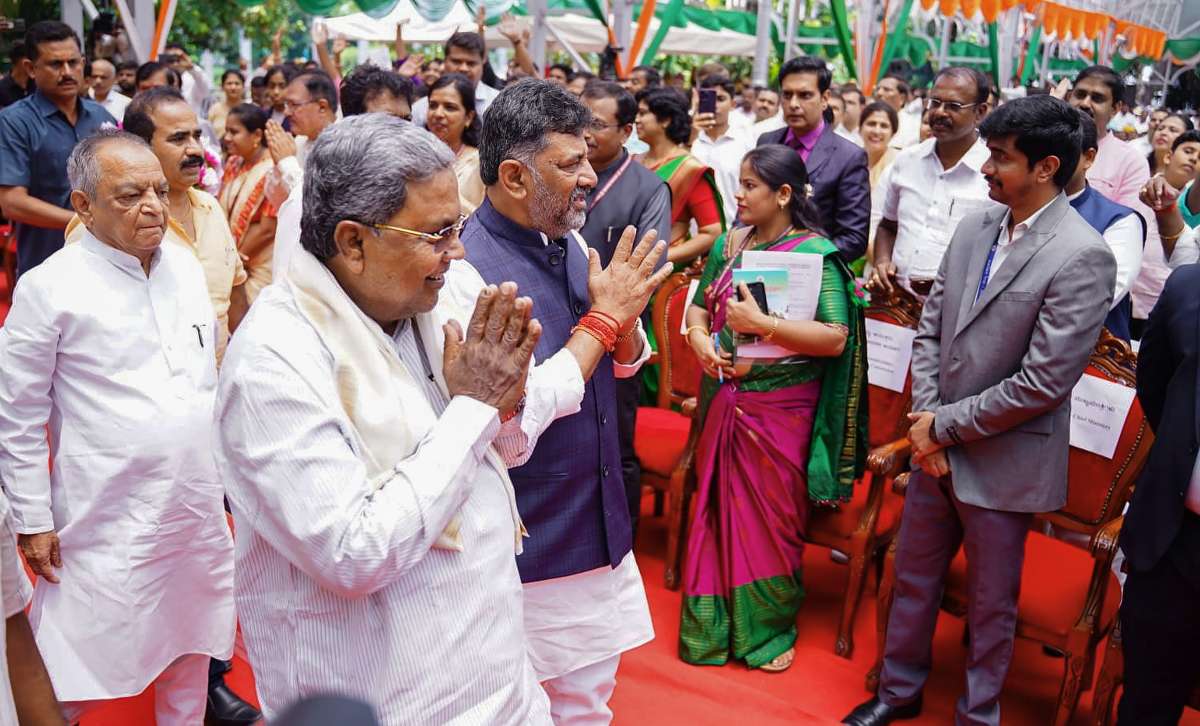


Senior BJP Leader M. P. Renukacharya has released a video implicating Minister Zameer Ahmad Khan and CM Siddaramaiah in an alleged plot to reclaim Waqf properties belonging to farmers and temples. This revelation comes amidst Congress' loss of credibility ahead of by-polls and the Chief Minister's ongoing controversies involving corruption and Muslim appeasement. Renukacharya has accused Zameer of being a "religious fanatic" and questioned his actions as a minister for minorities. Zameer, on the other hand, has claimed to be acting under the orders of CM Siddaramaiah, who has allegedly instructed him to conduct annual review meetings and visit every district to reclaim Waqf properties.
Waqf Board Controversy: BJP Alleges Plot by Congress to Reclaim Farm and Temple Properties
Amidst the ongoing political turmoil in Karnataka ahead of the upcoming by-polls, the Bharatiya Janata Party (BJP) has released a video implicating senior Congress leaders in an alleged plot to reclaim Waqf properties.
Background:
The Waqf Board is a statutory body that manages properties donated to the Muslim community for religious, charitable, and educational purposes. In Karnataka, the Waqf Board is responsible for managing over 40,000 properties.
BJP's Allegations:
Senior BJP leader M. P. Renukacharya released a video accusing Minister Zameer Ahmad Khan and Chief Minister Siddaramaiah of hatching a plot to reclaim Waqf properties belonging to farmers and temples. Renukacharya alleged that Khan, as the minister for minorities, was acting under Siddaramaiah's orders to conduct annual review meetings and visit every district to identify and reclaim Waqf properties.
Congress's Response:
Zameer Khan denied the allegations, claiming that he was only following the directions of the CM. Siddaramaiah has also denied any wrongdoing, stating that the BJP is trying to communalize the issue for political gains.
Political Implications:
The Waqf board controversy has added to the escalating political tension in Karnataka. The BJP, which is facing a tough battle in the upcoming by-polls, is hoping to capitalize on the issue to discredit the Congress government. The Congress, on the other hand, is trying to downplay the controversy and focus on its development agenda.
Top 5 FAQs and Answers:
1. What is a Waqf property?
A Waqf property is a property that has been donated to the Muslim community for religious, charitable, or educational purposes. Once a property is declared a Waqf, it becomes the absolute property of the Allah and cannot be sold, transferred, or mortgaged.
2. Who manages Waqf properties in Karnataka?
The Karnataka State Waqf Board is responsible for managing Waqf properties in the state. The Board is headed by a chairman and consists of members appointed by the state government.
3. What is the controversy about?
The BJP has accused the Congress government of plotting to reclaim Waqf properties belonging to farmers and temples. The BJP alleges that the government is misusing its power to target the Hindu community.
4. What is the government's response?
The government has denied the allegations and stated that the BJP is trying to communalize the issue for political gains. The government has also stated that it is committed to protecting the rights of all citizens, including the Muslim community.
5. What are the potential consequences of the controversy?
The controversy could escalate political tensions in Karnataka and further divide the Hindu and Muslim communities. It could also damage the credibility of the Congress government and make it more difficult for the party to win the upcoming by-polls.

Ranjana Sonawane, the first recipient of India's Aadhar card, still lacks access to government schemes 13 years later. Despite being eligible for the Chief Minister Majhi Ladki Behen Yojana, Ranjana has not received any money due to an issue with her Aadhar being linked to someone else's bank account. This case brings to light the flaws in the implementation of government schemes in rural and tribal areas, where women like Ranjana often have their funds misdirected or lack necessary information.

The Indian National Congress (INC) has announced its plans to launch a month-and-a-half-long campaign in Jammu and Kashmir on April 22. The purpose of the campaign is to demand the restoration of statehood and to further the “Save the Constitution” movement. With the recent appointment of Syed Naseer Hussain as the new J&K in-charge, the party hopes to regain its lost support in the Union Territory. This campaign comes at a crucial time, as former supporters of the Congress leader Ghulam Nabi Azad have recently dissolved their party, raising questions about their political future. The Congress hopes to use this opportunity to highlight the BJP's failures in empowering elected governments and its betrayal over statehood.

Thousands of citizens in Pune are rallying together through an online petition to demand the protection of their city's hills and hill slopes from any construction. The petition is addressed to the former Pune Municipal Commissioner and Chairman of the state-appointed Committee on Bio-Diversity Park and Hill Top Hill Slopes. The citizens are concerned that the committee's review may result in allowing construction on the hills, while strict measures have already been mandated by the government to prevent it. The citizens stress the importance of preserving these natural areas for the city's ecological balance and urge the government to uphold its promise to future generations.

After the devastating terror attack in Pahalgam, Jammu and Kashmir, India has suspended the 1960 Indus Waters Treaty with Pakistan. This decision was made during a key meeting chaired by Union Home Minister Amit Shah, with discussions on potential actions being taken against Pakistan. As tensions between the two countries continue to escalate, Indian leaders have condemned Pakistan for their involvement in the attack and have vowed to take strong measures in response.

The Indian Army made its first major move since the Pahalgam terror attack on April 22, as they killed top Lashkar-e-Taiba (LeT) commander Altaf Lalli in an encounter in Jammu and Kashmir's Bandipora district. The security forces are on the hunt for the terrorists responsible for the brutal killing of 26 civilians and have launched a massive anti-terror operation. In other developments, Indian Army Chief General Upendra Dwivedi visited Srinagar for a security review meeting and the authorities demolished the houses of two suspected terrorists involved in the Pahalgam attack.

In a hearing at the Supreme Court, the bench rebuked Congress leader Rahul Gandhi for his "irresponsible" comments about freedom fighter Vinayak Damodar Savarkar. The judges highlighted the need to show respect for India's freedom fighters and questioned whether Gandhi was aware of his grandmother and Mahatma Gandhi praising Savarkar. The court also stayed an Allahabad High Court order that refused to dismiss a lower court's summons against Gandhi over his alleged remarks about Savarkar.

The Supreme Court has stepped in to warn Congress MP Rahul Gandhi over his comments about India's independence activist Veer Savarkar, staying a trial court's summons to the politician. The top court emphasized that Savarkar is a highly respected figure in Maharashtra and stated that no one would be allowed to make derogatory remarks about freedom fighters. The court also pointed out that Gandhi's family has had a history of praising Savarkar and Gandhi himself has been warned that the court will take suo motu cognizance of any such remarks. Additionally, the article also mentions an attack in Jammu and Kashmir that has led to heightened tensions between India and Pakistan.

In a successful operation by the security forces, a Lashkar-e-Taliba (LeT) terrorist associate, identified as Altaf Lalli, was killed in an ongoing encounter in the Bandipora district of Jammu and Kashmir. The encounter began after the security forces received intelligence about the presence of terrorists in the area. Two security personnel have also been injured in the exchange of fire and are currently undergoing treatment at a nearby hospital. The clash highlights the continued efforts of the security forces to combat terrorism in the region.

The Telangana-Chhattisgarh border is a hotbed of tension as security forces step up their efforts to root out Maoist activity from the region. Top Maoist leader Hidma is the target of current high-security operations, with forces strategically advancing through previously inaccessible areas. With mounting pressure, sources indicate that the hold of the Maoists in the region is gradually weakening, making for a tense and critical situation.

As the nation grapples with the aftermath of a terror attack in Pahalgam, security forces are undertaking a massive operation in the dense Karregutta hills forest to eliminate the heart of Naxal command. This operation, involving 7,000 personnel and cutting-edge technology, aims to strike a blow at Naxalism by targeting top leaders of the PLGA Battalion No. 1. This bold move by the CRPF, with the Director General personally overseeing the operation, marks a turning point in the fight against Maoist insurgency. With five Naxals already killed and more likely to come, the operation is being hailed as a decisive victory and could potentially spell the end of Naxalism in India.